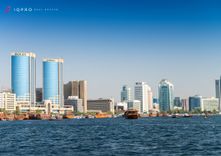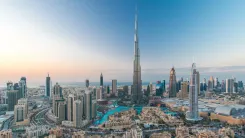The United Arab Emirates (UAE) boasts a dynamic real estate market, attracting significant local and international investment. With a vision for continued economic diversification and a focus on innovation, the future of real estate investments in the UAE appears bright. This overview explores the potential opportunities, emerging trends, and overall outlook for this ever-evolving sector.
Opportunities for Investment
Several key factors highlight promising opportunities for investors in the UAE's real estate market:
- Economic Growth and Diversification: The UAE government is actively pursuing economic diversification away from a reliance on oil. This strategy, coupled with strong GDP growth projections, creates a stable and attractive environment for real estate investments.
- Expo 2020 Legacy: Dubai's successful hosting of Expo 2020 is expected to have a lasting impact. The development of infrastructure, coupled with the emirate's focus on innovation and technology, positions it as a hub for global businesses and talent, driving demand for commercial and residential real estate.
- Favorable Government Policies: The UAE government consistently implements policies that promote real estate investment. These include streamlined business registration processes, free zones offering tax benefits, and attractive investor visa programs.
- Growing Population: The UAE's population is projected to increase steadily, fueled by a thriving economy and a welcoming environment for expatriates. This rising demand will translate into opportunities for residential property investment.
- Tourism Boom: The UAE's reputation as a global tourism destination continues to grow. This sector directly impacts the hospitality real estate market, presenting opportunities for investors in hotels, serviced apartments, and short-term rentals.
Emerging Trends Shaping the Future
Several trends are shaping the future of real estate investments in the UAE:
- Rise of PropTech: Technological advancements are influencing the real estate sector. PropTech solutions, encompassing online property portals, virtual tours, and AI-powered data analytics, are transforming user experience and streamlining investment processes.
- Focus on Sustainable Development: Sustainability is becoming a priority for developers and investors. Eco-friendly building practices, energy-efficient designs, and smart homes are gaining traction as investors recognize the growing demand for sustainable properties.
- Increased Demand for Co-Working Spaces: The rise of remote work and flexible working arrangements is driving demand for co-working spaces. These spaces offer businesses and freelancers cost-effective and collaborative work environments, presenting an attractive niche for real estate investment.
- Shift Towards Experience-Driven Living: Investors are recognizing the growing demand for residences that offer amenities and experiences beyond just shelter. This includes properties with integrated wellness facilities, co-working spaces, and entertainment options.
- Fractional Ownership: Fractional ownership, where multiple investors share ownership of a single property, is gaining popularity. This allows investors to participate in the market with a lower initial investment.
Regulatory Landscape and Investor Protection
The UAE government prioritizes investor protection. This is evident through initiatives such as:
- Real Estate Regulatory Agencies (RERA): Agencies like Dubai's RERA regulate the real estate sector, ensuring transparency and fair practices. These agencies implement developer registration requirements, escrow accounts for off-plan purchases, and dispute resolution mechanisms.
- "Tanweer" Law (Dubai): This proposed law aims to further strengthen investor protection by introducing standardized contracts, cooling-off periods for purchases, and stricter project completion deadlines with penalties for developers exceeding them.
These measures enhance investor confidence, making the UAE a more secure and attractive destination for real estate investment.
Risks and Challenges
Despite the promising outlook, some challenges and risks need consideration:
- Market Fluctuations: Like any real estate market, the UAE is susceptible to economic fluctuations that could impact property prices. Investors need to conduct thorough due diligence and be prepared for potential market adjustments.
- Geopolitical Tensions: The region's geopolitical landscape can influence investor sentiment. However, the UAE's stable and pro-business environment helps mitigate some of these risks.
- Oversupply in Specific Segments: While overall demand remains strong, oversupply concerns exist in specific segments, particularly luxury apartments in some areas. Investors should carefully research specific property types and locations.
Overall Outlook
The future of real estate investments in the UAE appears positive. The combination of economic growth, government support, and emerging trends creates a dynamic and exciting market. However, careful research, understanding of risks, and a long-term investment perspective remain critical for success.
Here are some additional factors to consider for the future:
- Impact of Metaverse and Web3: These emerging technologies have the potential to influence how people interact with and invest in real estate.
- Focus on Smart Cities: The UAE's focus on developing smart cities will present opportunities for real estate investments that integrate technology and promote sustainability.
By staying informed about these trends and conducting thorough due diligence, investors can capitalize on the promising opportunities in the UAE's real estate market. Here are some additional tips for success:
- Seek Professional Advice: Consulting with experienced real estate professionals can provide valuable insights into specific market segments and investment strategies.
- Diversify Your Portfolio: Diversifying across different property types (residential, commercial, hospitality) and locations can mitigate risk and provide exposure to different market segments.
- Consider Long-Term Investment: Real estate is a long-term investment. Understanding holding periods and potential rental yields is crucial for maximizing returns.
Conclusion
The UAE's real estate market is poised for continued growth and transformation. By understanding the opportunities, trends, and potential challenges, investors can make informed decisions and participate in this dynamic sector.
The government's commitment to economic diversification, regulatory reforms, and investor protection further strengthens the UAE's position as a leading destination for real estate investment in the region and globally.
Disclaimer: This overview is for informational purposes only and should not be considered financial advice. Always consult with a qualified financial professional before making any investment decisions.






